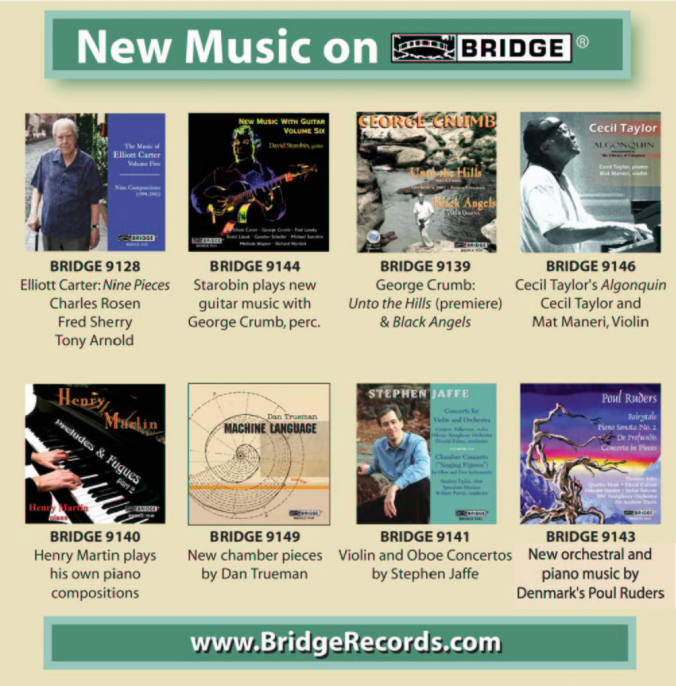|
|
Your
Ad Here!
Send Email to: publisher@newmusicon.org |
|
|
Your
Ad Here!
Send Email to: publisher@newmusicon.org |
CONTENTSPUSHING THE ENVELOPE:
The New Music Champion
Award, 4 THE HONOREES, 5 ALL ON BOARD, 6 LIVE EVENTS Clothed
in a Redemptive Tale (Paulk on Heggie), 10
DOTTED NOTES from … Kroll, Pehrson, BLC, 17 LEGATO NOTES:
More on Board, 19 THE SCOREBOARD:
THE CINEMA;
RECORDINGS: Mixing History and
Mystery Electronically (BLC on Martin Gotfrit),
24 RECENT RELEASES, 25 COMPOSER INDEX, 25
BRAVI TO …, 27
THE PUZZLE PAGE: |
Clothed in a Redemptive TaleBy James L. Paulk ©2004 Jake Heggie: The End of the Affair. With Teddy Tahu Rhodes and Cheryl Barker. Houston Grand Opera. Houston Texas. March 4, 2004. (world premiere) As this opera opens, Maurice (sung by Teddy Tahu Rhodes, a young Australian baritone) is naked in bed having sex with a nearly naked Sarah (soprano Cheryl Barker, also Australian). The sex is simulated (I think) but the nudity is quite real. Fortunately, the creators of this work have found a couple which can sing nicely naked, and look good (actually, very good) at the same time. One of the all-time best nude scenes in the history of opera, it was so riveting that much of the audience failed to focus on the two major musical motifs of the opera, which were being introduced while this was happening. No great damage was done, as the motifs recurred frequently. They were woven expertly into a sensuous tonal score, heavily chromatic in the orchestral line, with a wandering arioso vocal line. As this is a love story with a conservative score, you might expect an occasional big aria or duet, but none arrive. As in Heggie's popular opera Dead Man Walking, first performed in San Francisco in 2000, the score for "Affair" is well-crafted and atmospheric, but it isn't the focus of the evening. This is yet another of the "opera-plays" that constitute most of the over 200 new operas that have appeared in the U.S. in the last decade. A peculiarly American phenomenon, these are "safe" works, almost always derived from popular plays, movies, or books. Even at their best — and this is certainly one of the better efforts — the effect is that of watching a very good play with an unusually classy soundtrack. The book in question is, of course, Graham Greene's novel of the same title, based loosely on his own affair with Lady Catherine Walston. In England during World War II, a writer (Maurice) has an affair with the wife of a government minister (Sarah). A bomb strike nearby seems to kill Maurice; Sarah prays, promising God that she will end the affair if he will bring Maurice back. Maurice then appears, quite alive, and without revealing what has happened, she leaves him and keeps the promise. It is a darned good novel. Beneath the surface love affair is a provocative exploration of the question: "Is there a God?" Other subtexts include the question of whether a miracle happened (Maurice's resurrection) and whether Catherine is a saint (she appears to heal several others and is loyal to her oath despite great temptation). Surprisingly, given the reduced number of words, the opera libretto is much better at exploring these questions than the popular 1999 movie starring Ralph Fiennes and Julianne Moore, which simplified the novel into a love story. Unfortunately, the librettist, playwright Heather McDonald, tacks on a rather shameless Hollywood ending: the resurrected Sarah appears, telling Maurice that "love never dies." He is redeemed. This is really a chamber opera in scale. It has only six singers, and there are 24 instruments in the orchestra (an expanded version will be used when the opera moves to the Madison Opera, where it will inaugurate their new opera house). But there is nothing "chamber" about the demands on the singers, especially for the role of Sarah, which features a cruel tessitura. Ms. Barker delivered nicely. She seems more comfortable with the top notes than the lower and middle registers, but she handles the acting chores convincingly, and she even seems to change in the course of the opera, becoming more focused and assured as her spiritual faith develops. Of course, she also has the body for the opening scene. New American operas are almost always cast with skinny singers. Which brings us to Mr. Tahu-Rhodes, the Maurice, whose body has already been mentioned. He, too, was a convincing actor, displaying a wide and convincing emotional range. But there is a sameness to his singing, and it would be nice to hear this role sung by someone with a more nuanced vocal approach. Peter Coleman-Wright, another baritone, is married to Ms. Barker in real life and sang the role of her husband, Henry. He has a good solid voice, the best of the evening, and he managed to make his character come across as bland (which he is supposed to be) but sympathetic. Robert Orth, yet another baritone, sang the role of Parkis, a detective hired by Maurice to spy on Sarah. He invested his character with a heavy Cockney accent, a nice atmospheric touch. The role of Sarah's mother is a tricky one. She is a crass, vulgar, man-crazy woman, and here she is used to provide comic relief. But she still needs to be believable, as one of the miracles concerning Sarah is that such a graceful woman could come from this source. Mezzo Katherine Ciesinski succeeded mostly in this portrayal, even if she veered a bit towards buffoonery. Tenor Joseph Evans nicely sang the role of Smyth, a rationalist minister, who has one of the evenings few good arias. Patrick Summers conducted briskly and deftly. The sets, designed by Michael McGarty, featured realistic Gothic stone walls and a large stained-glass rose window. Leonard Foglia directed brilliantly — these were singing actors in the best sense, and Foglia made the most of the opportunity. |
